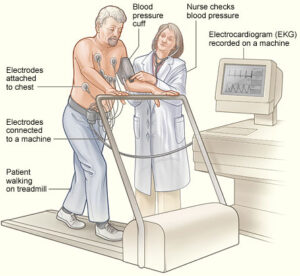 An exercise stress test measures the performance and capacity of the heart under stress by observing your ECG while walking on a treadmill. Exercise stress tests are used to:
An exercise stress test measures the performance and capacity of the heart under stress by observing your ECG while walking on a treadmill. Exercise stress tests are used to:
- assist in making a diagnosis of coronary artery disease,
- evaluate a patient’s capacity to undertake certain physical activities or occupations,
- assess prognosis in patients with heart disease, and
- assess the effect of treatment on symptoms.
Please advise us when booking
- If you are taking any heart or blood pressure medications, as some medications may interfere with your test and prevent accurate diagnosis.
- If you have any physical or medical condition which would impact your ability to walk on a treadmill.
Preparation
You may be advised to wean or omit certain medications prior to your test. You must discuss this with your doctor prior to doing so.
Please bring to your appointment:
- your referral and Medicare, Pension and/or Health care cards.
- a list of current medications
In preparation for your test procedure:
- Do not apply any lotions or creams to the chest region.
- Wear comfortable walking / running shoes for the treadmill and a two piece outfit i.e. top and shorts or pants.
Chest hair may need to be shaved to allow the electrodes to adhere to the skin. The technician will do this at the time of the test.
What happens during the test procedure
- You will need to remove your clothing from the waist up. Women may leave their bra on and may be offered a gown to wear.
- You will be connected to a heart monitor and required to walk on a treadmill which increases gradually in speed and incline.
- Your heart rate, blood pressure and electrocardiogram (ECG) will be continually monitored.
- A cardiologist and a cardiac technician will be present at all times, and will ask regularly if you are experiencing any symptoms such as shortness of breath, chest pain or dizziness. They will also inspect the ECG for any indication that your heart is not getting enough oxygen, signalling obstructed coronary arteries.
- The test ends when you achieve an appropriate target, or if you develop symptoms such as fatigue, breathlessness, dizziness, tired legs or chest pain.
- If at any time during the test you are feeling unwell in any way, report the symptom immediately.
How long does it take
Approximately 30 minutes
Risks
This test is usually performed on patients with known or suspected coronary artery disease, so there is a risk that potential complications may arise.
- The major potential complication during an exercise stress test is having a heart attack. The risk of this occurring is rare and death has been rarely reported (1 in 10,000).
- Other complications may include significant heart rhythm disturbances, dizziness or prolonged chest pain.
The procedure room is equipped with emergency equipment and experienced staff are in attendance, should an emergency situation arise.
After your examination
You can usually go back to your normal activities including resuming your regular medications if you omitted any for the test.
Your images and report
A report will be sent to your referring doctor. It is very important you return to your doctor to discuss your examination results.
Magnolia Specialist Centre will store an electronic copy of your stress test in our secure database for comparison with any future studies.
This content is intended for informational purposes only. It is not a substitute for professional medical advice. If you require any clarification, please contact your clinician for further information.